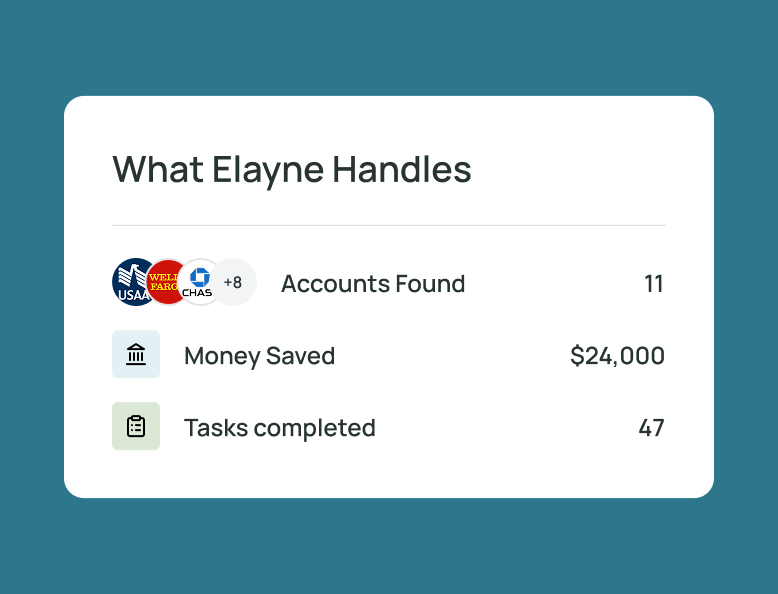The loss of a loved one is a profound experience that doesn't pause at the office door, and supporting employees through such times is crucial for their well-being and the overall health of your team.
The harsh reality is that many managers feel unprepared to address grief despite its inevitability. Annually, the United States sees over 2.5 million deaths, with each of these individuals leaving behind an estimated one to five close connections.
At Elayne, we understand the importance of providing support and solutions to ensure employees facing loss are met with compassion and comprehensive care.
In this article, we'll explore essential strategies for creating professional support systems for bereaved employees, highlighting how early support, comprehensive bereavement policies, and leadership in grief support can make a substantial difference.
Essential Early Support Strategies
Supporting employees through grief begins the moment you become aware of their loss. The strategies you employ in these initial stages can significantly impact their healing process and relationship with work during this challenging time.
Here are some essential early support strategies that can make a meaningful difference.
Immediate and Compassionate Communication
How an organization responds to an employee's loss can set the tone for the entire grieving process. It's crucial to reach out with empathy, acknowledging their loss personally and respectfully.
These touch points might involve sending a condolence message, offering support, and making it clear that their well-being is the priority. Remember, the goal is to make them feel supported, not pressured to return to work before they're ready.
Offer Flexible Work Arrangements
Grief doesn't adhere to a strict timeline, and returning to a full workload immediately might not be feasible for everyone. Offering flexible work arrangements, such as reduced hours, remote work options, or a phased return to work, can give the bereaved the space to grieve while still feeling connected to their professional life.
This flexibility acknowledges the profound impact of their loss and the variability in individuals' grieving processes.
Provide Access to Professional Support
Early access to counseling services or an employee assistance program (EAP) can be invaluable for employees navigating grief. Professional support can offer strategies for coping and healing, helping employees manage their grief more effectively.
Ensuring employees are aware of these services and how to access them ensures they have the support they need right from the start.
Establish a Point of Contact
Designate a compassionate and trained HR professional or manager as a point of contact for the bereaved employee. This person can check in with the employee, coordinate any necessary workplace adjustments, and serve as a liaison between the employee and the rest of the team.
Having a single point of contact can simplify communication for the employees and ensure they receive consistent and sensitive support.
Implementing these early support strategies demonstrates a commitment to the well-being of employees during some of the most challenging times of their lives.
By taking proactive steps to support bereaved employees from the outset, organizations can foster a culture of empathy and understanding, ultimately strengthening the bond between the employer and the workforce.
Comprehensive Bereavement Support
Providing comprehensive bereavement support is crucial for fostering a supportive and empathetic workplace culture. This support goes beyond the initial days following the news of a loss, extending into the weeks and months as the employee navigates their grief journey.
A well-rounded bereavement support program encompasses several key components designed to address the multifaceted nature of grief.
Creating a Supportive Environment
The foundation of comprehensive bereavement support is a workplace environment that acknowledges grief as a natural, albeit challenging, part of life. Employers can cultivate this environment by encouraging open discussions about loss and grief, thereby reducing the stigma and isolation that bereaved employees may feel.
This process involves training managers and team leaders on how to approach and support grieving colleagues sensitively and effectively. Such training should cover recognizing signs of grief, offering appropriate condolences, and understanding the varied expressions of grief.
Peer Support Networks
Implementing peer support networks or grief support groups within the organization can provide a communal space for employees to share their experiences and feelings. These networks, whether formal or informal, offer solace and understanding from colleagues who have undergone similar experiences. They reinforce that the grieving employee is not alone, promoting a sense of belonging and mutual support.
Resource Accessibility
Ensuring employees have easy access to grief counseling and mental health resources is another pillar of comprehensive bereavement support. These resources might include partnerships with external counseling services, access to employee assistance programs (EAPs), and providing a list of local and online support resources.
Additionally, creating an internal repository of grief-related materials, such as articles, books, and videos, can help employees find information and comfort at their own pace.
Ongoing Support
Grief does not adhere to a set timeline, and as such, bereavement support should be ongoing. This means regular check-ins by managers or HR, adjustments to workloads as needed, and flexibility in work arrangements over the long term.
It's also important to recognize significant dates, such as anniversaries of the loss, which can be particularly challenging for the bereaved employee.
By implementing these strategies, employers can offer comprehensive bereavement support that addresses both the immediate and long-term needs of grieving employees.
This not only aids in the healing process but also strengthens the overall resilience and cohesion of the team, creating a workplace where employees feel genuinely supported in times of loss.
Extended Bereavement Leave Policies
Traditional bereavement leaves, often limited to a few days, are typically insufficient for employees to grieve, manage funeral arrangements, and begin the healing process.
Recognizing and accommodating the time it truly takes to navigate these challenges is a critical step in supporting employees through their grief.
Redefining Leave Duration
A more compassionate approach to bereavement leave involves extending the duration beyond the conventional period. This extension acknowledges the complexity of grief and the reality that individuals cope with loss in different timelines.
By allowing employees more time away from work, employers give them the space needed to grieve without the added pressure of returning to work prematurely. Such policies might offer two weeks or more of leave, providing a more realistic timeframe for the initial stages of grief.
Inclusivity in Leave Policies
Modern families come in all shapes and sizes, and bereavement leave policies should reflect this diversity. Expanding the definition of family within these policies to include non-traditional family members, close friends, and significant others ensures that all employees receive support during their time of loss.
Recognizing the depth and variety of individuals' relationships honors the genuine grief they experience, regardless of the legal or biological ties to the deceased.
Flexible Return to Work
Understanding that grief doesn't have a set endpoint, flexible return-to-work options can ease the transition back into the workplace. This flexibility might include part-time hours, remote work options, or a phased return to work.
Such accommodations recognize that productivity and the ability to focus can fluctuate significantly as employees navigate their grief.
Support Upon Return
Extended bereavement leave policies should also consider support mechanisms for when an employee returns to work. This support could involve temporarily reducing responsibilities, continued access to counseling services, and regular check-ins with management or HR to assess ongoing support needs.
By adopting extended bereavement leave policies, employers demonstrate a profound understanding of the grieving process and a genuine commitment to employee well-being.
These policies provide the necessary time and space for employees to grieve and foster a culture of empathy and support within the organization, ultimately contributing to a more compassionate and resilient workplace.
Leadership in Grief Support
Effective leadership plays a pivotal role in shaping the support system for bereaved employees. Leaders set the tone for the organizational response to grief, demonstrating how employees can expect to be treated during their most vulnerable times through their actions and policies.
A leader's approach to grief support can significantly influence the workplace culture, impacting how employees cope with loss and how they perceive their employer's empathy and understanding.
Modeling Compassionate Support
Leaders must embody the compassionate support they wish to see throughout the organization. This support involves openly acknowledging loss, expressing genuine sympathy, and visibly supporting bereaved employees.
By doing so, leaders encourage a culture where grief is recognized and respected rather than ignored or stigmatized. Leaders must show that expressing vulnerability and seeking support is acceptable, breaking down barriers that might prevent employees from accessing the help they need.
Implementing Training and Education
Leadership in grief support also involves ensuring managers and supervisors have the knowledge and skills to support grieving team members effectively. This support can be achieved through targeted training programs that cover the basics of grief awareness, communication strategies, and the practical aspects of implementing bereavement policies.
By investing in education, leaders ensure that all levels of management are prepared to offer consistent and sensitive support.
Creating a Culture of Openness
Leaders can foster an environment where employees feel comfortable sharing their experiences and seeking support by promoting openness and understanding around the topic of grief. This concept might involve organizing workshops, sharing resources, or hosting speakers on grief and loss.
Encouraging open dialogue helps to normalize conversations about grief, making it easier for employees to come forward with their needs.
Ongoing Support and Flexibility
Leadership in grief support extends beyond the immediate aftermath of a loss. Leaders should advocate for and implement policies that offer ongoing support to bereaved employees, recognizing that grief does not have a fixed timeline. This support includes flexible working arrangements, adjustments to workload, and continued access to counseling services.
Regular check-ins with the bereaved employee can help leaders assess their ongoing needs and adjust support accordingly.
Leadership in grief support is about more than just policies and procedures; it's about building a culture of empathy, understanding, and compassion.
Through their actions and commitment, leaders can profoundly affect how grief is managed in the workplace, offering bereaved employees the support they need to navigate their loss and rebuild their lives.
Final Thoughts
Supporting bereaved employees requires a thoughtful, comprehensive approach that extends beyond the immediate aftermath of loss. By implementing early support strategies, comprehensive bereavement support, and extended leave policies, managers can create a workplace that truly supports its members through some of life's most challenging moments.
Leadership plays a crucial role in this process, setting the tone for a compassionate and understanding work environment.
At Elayne, we specialize in preparing teams for the event of loss, offering services that ensure employees are supported comprehensively through their grieving process. For managers looking to enhance their support systems for bereaved employees, we invite you to book a demo call with us.
Together, we can create a workplace where every employee feels valued and supported, even in the face of loss.
Let Elayne guide you in strengthening your team's resilience and compassion, ensuring your employees are well-supported in times of loss.














































